
 By making sure no game gets left behind Hooded Horse is pulling ahead of its indie rivals. Richie Shoemaker saddles up with CEO Tim Bender and CFO Snow Rui to find out how the publisher intends to keep up the pace.
By making sure no game gets left behind Hooded Horse is pulling ahead of its indie rivals. Richie Shoemaker saddles up with CEO Tim Bender and CFO Snow Rui to find out how the publisher intends to keep up the pace.
A couple of years ago if we’d had said that Hooded Horse was among the indie publishers to keep a close eye on in the post-pandemic era, the socially-distanced response from behind most masks would likely have been a muffled “Who did, what?” Understandable, since until three years ago the Dallas-based company barely existed and has been operating very much under the radar ever since.
“We were officially founded in 2019, but we only signed one game,” says Tim Bender, Hooded Horse’s CEO. That game was Terra Invicta, the first title from the team behind the popular Long War mod for XCOM, which launched into early access last September. “We didn’t release anything until May of last year,” (Old World – when it expanded onto Steam from the Epic Game Store), “So if you hadn’t heard of us until mid 2022, that’s pretty natural.”
Part of the reason for the outfit’s low profile is that its portfolio of games – recently up to 20 – are all currently exclusive to PC. Almost all of them are in or coming to early access, and for the most part exist in a niche web of strategy and RPG genres. Current and future releases include XCOM-style tactical games, a pleasing number of space strategy games, 4X games, a couple of city builders and a good few others; most of which wouldn’t look out of place coming from a more established house like Slitherine or Paradox – both of which were established more than 20 years ago.
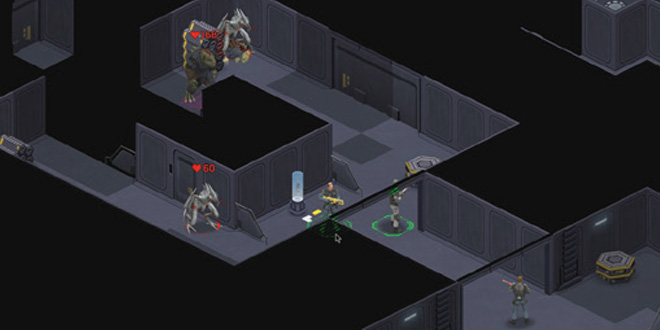
“We have tried to focus on one particular niche of indie games for a couple of reasons. One is our own expertise and what we’re qualified to market, to understand, to work with.” Bender explains that he has a particular interest in strategy games that have RPG elements and vice versa. Everyone else at the company is also a fan of strategy games of one flavour or another, and that is where their combined expertise intersects. “If we were to broaden beyond the strategy-simulation-RPG and instead publish things like first-person shooters, that would go so far outside of our expertise that we would end up becoming far less effective. By going to an area that we all broadly understand and every game we’re publishing is one that I can play, we end up getting a pretty good grip on this area of games, how to market them and understand them.
“The second part is that there’s a benefit to having an identity with consumers – especially fans of strategy games and RPGs – where they understand us as a publisher and get excited about what we’re coming out with. Specialisation really helps out and there are more than enough great indie strategy games to keep us busy.”
Snow Rui, president and CFO of Hooded Horse – and wife to its CEO – is quick to add that there is a practical benefit to keeping a narrow focus on strategy games, in that the resources needed to finish a game are far less costly compared to a similarly-pitched action game. “With a brilliant small team that are just focused on getting the mechanics right, they can have a really exciting game that can compete well with another game from a studio that’s ten to twenty times the size with a much larger budget.”
DARK FOALS
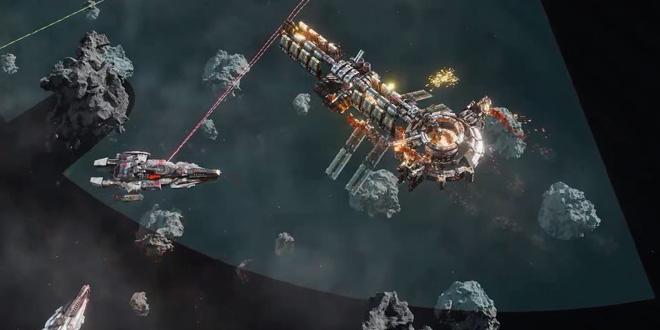
It’s rare to speak to a leadership team that is quite so open about the games it enjoys, less so one that admits to only having a commercial interest in that same narrow cross section of genres. Were that the case at a AAA publisher we doubt many games would make it out the stable door, but at Hooded Horse it’s a strategy that appears to be working out.
Over the course of the last year, Hooded Horse has released five games, four of them to early access and the company has been remarkably open as to how each has done. The first of them, Nebulous: Fleet Command, sold 73,000 units in its first year, which isn’t especially impressive, until you consider what a niche hard sci-fi strategy game it is. The publisher’s most recent game, Against The Storm, is its most successful, shifting 317,000 copies in its first three months on sale and inspiring 7,500 Overwhelmingly Positive reviews. As for what’s on the near horizon, Hooded Horse has three titles among the most 100 wishlisted games on Steam, more, it seems, than any other publisher (Bethesda has two).
Among them, the Homeworld-inspired Falling Frontier sits just below Homeworld 3, comfortably ahead of the likes of Funcom’s Dune survival game, Daedalic’s delayed Lord of the Rings: Gollum and even the imminent System Shock remake that recently adorned the cover of PC Gamer. Way up in fifth is Manor Lords, a game that more PC gamers seem interested in than ARK 2, Payday 3, Resident Evil 4 and Respawn’s imminent Star Wars Jedi: Survivor.
“There’s a whole philosophy to doing this that’s basically ‘make sure every game succeeds,’” says Bender, unconcerned that 17 Hooded Horse games fall outside Steam’s top 100. “Our current crop of games are all successful, I think, in large part because we haven’t looked at the one selling the most and said, ‘Let’s just double down on that and forget the rest.’ Because the truth is that most games can succeed if you don’t have this very commercial, what’s-the-highest-return-on-investment attitude.”
FARRIER COMMAND
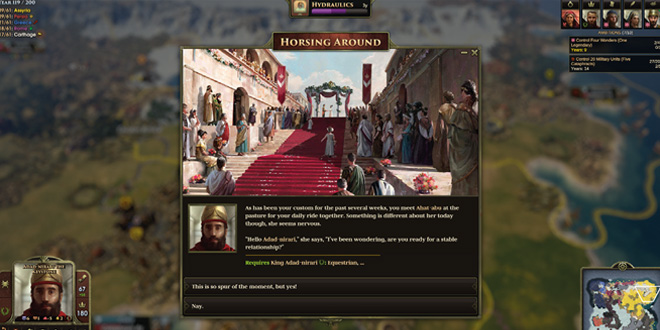
Fundamental to the rising-tides-lifts-all-boats strategy that Hooded Horse is committed to is the idea of allowing developers a share of the revenue that’s not tied to publishing costs. “There’s some objectively odd things about the way the publisher development work relationship has grown up in indie publishing,” says Bender, citing the prevalence of recoup terms, where a publisher will insist on hoarding all the sales revenues until it’s recovered its investment. “I honestly have no idea why that has become the norm in indie publishing.” It doesn’t make sense, because, says Bender, a publisher will have some games that do well and others that don’t, but it’s spreading its bets to offset risk. “Developers on the other hand, have a very limited ability to absorb risk because they often have one game.” If a developer is hampered by unfavourable recoup terms, even a successful game might not save it from having to lay off staff or even shut down entirely.
“Also in many cases it’s bad for consumers and even the publishers, because where there should be support and expansion for the things that will cause that game to sell more in the long term, many games are abandoned by developers and players blame them, but they had no choice financially. The only choice they had was to move on because they needed to go to the next publishing deal. It’s just run from one game to the next because they’re trapped in the cycle of these recoups. If you look at all of our games, every single one of them is releasing tons of post release support and expansion. That’s true of all five release games, and that’s part of why they’re successful. That’s what drives the sales. You can actually be better off taking less, because the whole pie gets bigger when you make sure developers are taken care of and have what they want.”
Bender says there’s no ‘Hollywood accounting’ at Hooded Horse. Standard terms are no recoup and the developer gets 65% of all revenues, with Hooded Horse’s share covering things like localisation and marketing. “Very, very occasionally, a developer might want something where we start out a little higher. If a developer really wants to drive that percentage down, we’ll do an alternative where we take 50% and then after a period we drop down to 30%. Very few developers take that, but a couple of them have been really wanting to drive that extra 5% long term. Most developers just want just no recoup and simple percentages.”
NEED FOR STEED
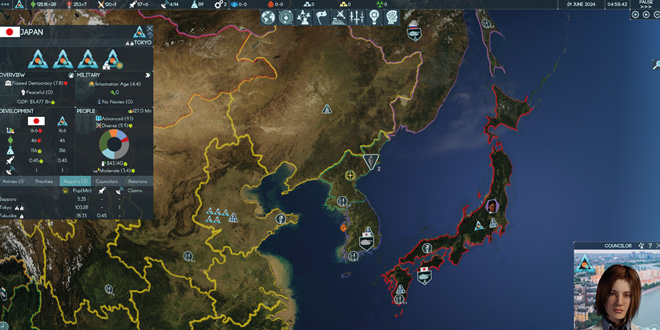
If by doing away with recoup terms in publishing agreements allows for a developer to provide long-term and post launch support, fundamental to that would appear to be the idea of early access. Of its five published games, four are currently in early access development and the other, Old World, was signed as it was leaving. Is it safe to assume that a fair number of Hooded Horse games will be joining them?
“Early access is a great model for developers who want to hear community feedback, develop in response to it and plan for a lot of expansion after release. There’s early access done wrong, when you release a game that really shouldn’t be released and call it early access – that doesn’t go well. But if you release a good game that you want to add more to, then that is generally a very positive experience for everyone.”
There is a danger of course that a game could outstay its welcome in early access; that in the oven of development, so to speak, it might not rise as expected, or become a little burnt around the edges for being in the heat too long. Might that become an issue?
Bender insists on going off the record to reveal which games will be hitting v1.0 before Rui cuts in to point that each developer has its goals for early access and that it isn’t just encouraged to make realistic and meet, but provide a roadmap that at least points to a full release.
“Clan Folk has a definite roadmap. It’s there with every update. You’ll start up the game, you have a screen that shows what’s been added, what’s left to do in the roadmap. The developer has a cadence of having a major update every one to two months. So yeah, they all know what they intend to do before 1.0 and they’re making steady progress towards it.”
STALLION HEARTS
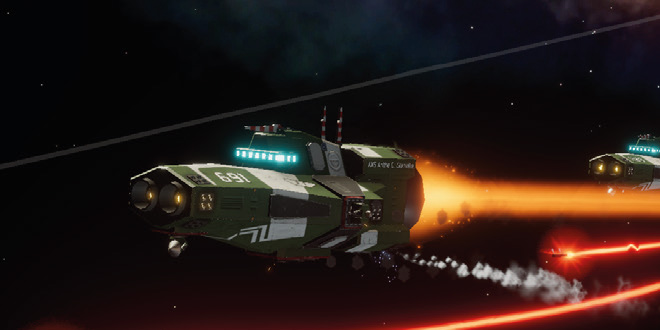
When asked to define what success means, Bender pitches a low bar: So long as the Hooded Horse team gets paid, jobs are secure and the developers have all the support they need to make the games they all want, he considers the business to be doing well.
“We’re not really chasing the big viral hit that’s going to become the biggest thing in the world. We may have stumbled upon that anyway with Manor Lords, so maybe that happens by accident, but it’s not what we measure success by. Success is just consistent performance for every developer. Consistent as in we’ve got enough funding, no one feels financially insecure and everyone goes on to create more games.
“As far as how we’ve been able to do it … There’s no answer to that that’s honest that doesn’t say that Paradox paved the way. There’s a lot of great strategy game publishing developers – Firaxis, SEGA – but it’s hard to imagine games like Terra Invicta existing and finding its market without Paradox creating gamers who expect to see this complicated map that is going to scare almost everyone away. So we owe a ton to Paradox and what they’ve done, and we owe a ton to Firaxis and Civ and Sid Meier because they paved the way for those broader things, and we owe a ton to the great wave of indie city builders have been created and that helped lay the market for Against the Storm.”
“Our devs are resources to each other,” adds Rui. “Because they are all working the strategy space, they often tackle similar issues, like how to efficiently do pathfinding. They talk freely with each other, which is really rare for any publisher and has proven to be incredibly valuable.”
“The other thing that’s helped,” adds Bender, “to be perfectly frank, is not being greedy.”
LITTLE NIGHT-MARES
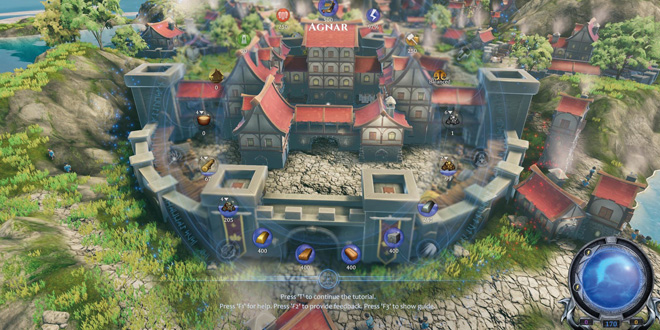
So, to recap, sticking to a proven niche, agreeing reasonable terms with developers, and providing a sustainable and supportive publishing environment are why Hooded Horse seems to be breaking ahead of the indie pack. At those common sense ideals we imagine there are a fair few developers reading this and planning a roguelike city builder for their next game. But what are the top-hatted business brains thinking as they tweak their pencil-thin handlebar moustaches? There has to be a downside to this utopian nonsense, surely?
“We delay games like no-one else,” laughs Bender. “The conversation around a release is never ‘We’re planning to release, make the deadline!’ The conversation is always ‘Hey, how do you feel? Do you feel like the game is getting ready?’ and then, even if the developer says yes, we probe further and say ‘How would a little bit more time help you? How would that change things?’ And the end result is that we delay games. In an environment where developers know that we’ve got their backs, that is a cost of doing business.”
That Hooded Horse can afford to be on the side of its developers, it helps, that the company has no outside investors – none that exist far beyond the Venn diagram of fans, friends and family at any rate. It begs the question, then, if it was necessary for the company to survive that it take on investment that would change how Hooded Horse operates …
“We’d do it,” says Bender before the question is complete. “Yeah, and it’ll change you. There’s no way to avoid it. But the truth is, if it’s between that or not being able to fund games that need funding in terms of support and jobs, we would accept the money and then we would have to pay a price.”
Let’s hope Hooded Horse stays ahead of the game so that particular night-mare scenario doesn’t come to pass.

 MCV/DEVELOP News, events, research and jobs from the games industry
MCV/DEVELOP News, events, research and jobs from the games industry




